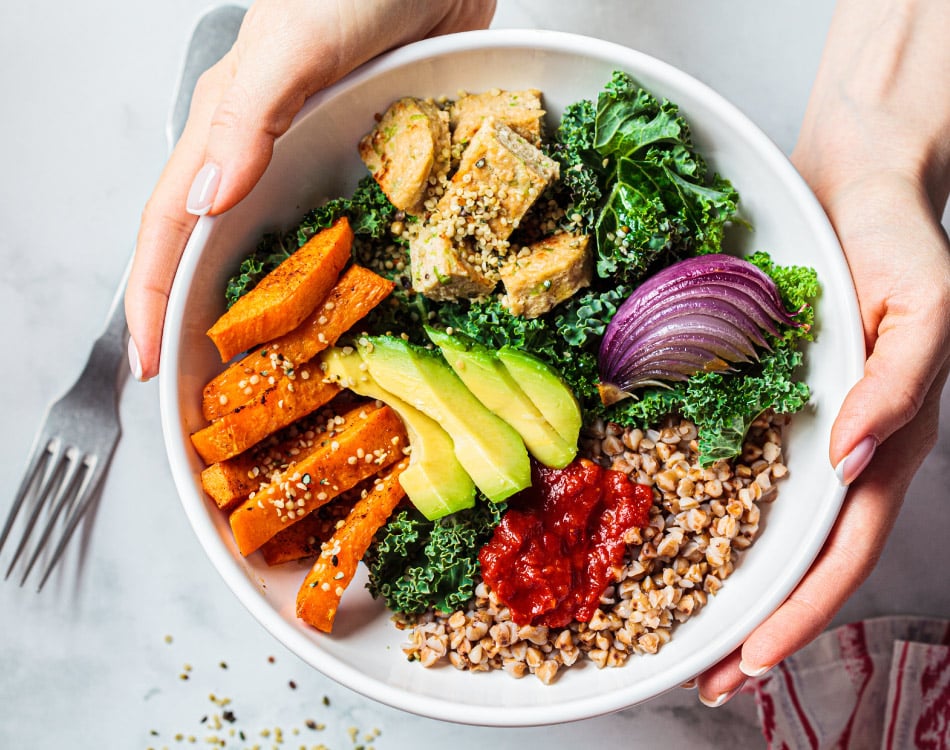If you want to follow a wholesome, healthful and sustainable approach to eating, avoid falling prey to these common diet myths.
READ MORE | Boost Vitamin B12 To Enjoy Vibrant Health, Vitality And Cognitive Function
Myth #1: Vegans get all the nutrients they need from plants
A plant-based diet that contains a variety of ingredients such as legumes, fruit, vegetables, seeds and nuts will provide a broad spectrum of nutrients needed to achieve optimal health.
However, modern farming practices, food preservation, transportation, storage and packing methods, and cooking can deplete nutrients in plant foodstuffs.
For example, issues such as over-farming can deplete vitamin B12 in soil. As such, vegans could benefit from taking a vitamin B12 supplement and including diet-approved fortified foods like cereals and plant milks in their shopping trolley.
Other supplements that vegans could include to make up for potential deficiencies in their diet due to a lack of animal-based foods include:
- Calcium
- Vitamin D3
- Iron
- Omega-3 fatty acids
- Zinc
- Iodine
If you suspect you suffer from a deficiency, speak to your dietitian or doctor for a personalised supplement intervention.
READ MORE | Avoid The Weight Rebound After Dieting
Myth #2: You can out exercise a bad diet
While this isn’t entirely false, in general, exercise in isolation is inefficient at reducing weight for various reasons.
For instance, most people simply don’t have enough time each day to exercise sufficiently to burn a significant number of calories.
Even the most intense hour-long session will struggle to burn more than a few hundred calories. Without addressing your dietary intake, you will need to do roughly two hours of exercise per day to lose weight.
As such, safe and sustainable weight loss requires at least a moderate daily calorie restriction of up to 500 calories a day, coupled with regular exercise.
READ MORE | Calories And Kilojoules: Know The Difference, It’s Important!
Myth #3: A calorie is a calorie
While this is true from a pure energy standpoint – all calories provide the same amount of energy (4,184 Joules to be exact) – the source of each calorie matters.
The body digests and metabolises calories from fat, protein and carbohydrates in different ways. In addition, these macronutrients have different effects on your hormones, which affect hunger, fat storage and energy production, to name a few.
Sugar-derived calories, for example, spike insulin, which is the body’s main fat-storage hormone. And when there is too much glucose (from ingested sugar) circulating in our bloodstream, there’s no need to tap into fat stores for energy.
Calories derived from whole, natural foods also generally contain more micronutrients – the important vitamins, minerals and phytonutrients our bodies need to function optimally – whereas calories from processed, refined or convenience foods generally provide less nutritional value unless fortified.
READ MORE | 10 Tips To Unlock Ketosis For Fat-Fuelled Energy
Myth #4: Eating fat makes you fat
Eating any type of food in excess will increase our weight, but it is processed and refined carbohydrates and sugar that tend to have the biggest impact on our waistlines.
Reducing our intake of these types of carbohydrates and sugar improves our insulin response and sensitivity, which directly affects how much fat we store, and also makes the body more efficient at metabolising stored fat for energy.
We also need to eat certain fats to ensure our metabolism functions optimally, because various fats are critical for the production of hormones. For example, our bodies need some saturated fat (roughly 10% of total fat intake) and cholesterol to produce testosterone, which is an important hormone needed by both men and women to produce more muscle and burn fat.
Of course, not all fats are created equal. Processed trans fats and hydrogenated oils can negatively impact our weight and our health.
Fat is also more satiating than carbohydrates because it is more calorie dense, providing nine calories per gram compared to four calories from carbs. This energy density can increase feelings of satiety, especially when consumed with protein. However, it can contribute to weight gain when we consume fats in excess of daily recommended intakes.















